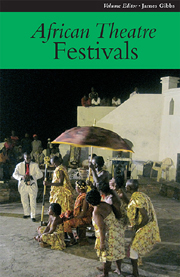Book contents
- Frontmatter
- Contents
- Notes on Contributors
- Obituary of Efo Kodjo Mawugbe
- Introduction by James Gibbs
- Festivals as a Strategy for the Development of Theatre in Zimbabwe 1980–2010
- The Legacy of Festac '77
- Festac, Month by Month & Soyinka's Involvement
- The Dakar Festivals of 1966 & 2010
- African Renaissance between Rhetoric 30 & the Aesthetics of Extravagance FESMAN 2010 – Entrapped in Textuality
- Theatre Programme for FESMAN & Commentary
- The Pan-African Historical Theatre Festival (PANAFEST) in Ghana, 1992–2010
- PANAFEST through the Headlines
- International Festivals & Transnational Theatre Circuits in Egypt, 1988–2010
- The Jos Theatre Festival 2004–2011
- The Grahamstown Festival & the Making of a Dramatist An interview with ANDREW BUCKLAND
- Playscript
- Book Reviews
The Jos Theatre Festival 2004–2011
A theatre festival in a divided community
Published online by Cambridge University Press: 05 May 2013
- Frontmatter
- Contents
- Notes on Contributors
- Obituary of Efo Kodjo Mawugbe
- Introduction by James Gibbs
- Festivals as a Strategy for the Development of Theatre in Zimbabwe 1980–2010
- The Legacy of Festac '77
- Festac, Month by Month & Soyinka's Involvement
- The Dakar Festivals of 1966 & 2010
- African Renaissance between Rhetoric 30 & the Aesthetics of Extravagance FESMAN 2010 – Entrapped in Textuality
- Theatre Programme for FESMAN & Commentary
- The Pan-African Historical Theatre Festival (PANAFEST) in Ghana, 1992–2010
- PANAFEST through the Headlines
- International Festivals & Transnational Theatre Circuits in Egypt, 1988–2010
- The Jos Theatre Festival 2004–2011
- The Grahamstown Festival & the Making of a Dramatist An interview with ANDREW BUCKLAND
- Playscript
- Book Reviews
Summary
Introduction
In an article jointly written with Victor S. Dugga that appeared in African Theatre: Companies (2008), I told part of the story of the Jos Repertory Theatre (JRT). Here I will draw out a single strand from our experience - the organisation of a series of theatre festivals - and explore what lessons can be learnt from trying to foster an elaborate theatre event in a city being swept into a self-destructive spiral. Since background erupts into the foreground in this study, it is important to sketch in something of the geographical, social, cultural and political context of the city of Jos in which JRT has endeavoured to establish and maintain an annual Festival.
Capital of the appropriately named Plateau State, the city of Jos enjoys a pleasant climate and boasts beautiful rock formations. For many decades, it was regarded as a rich melting pot of communities and performance traditions. With the arrival of television in Nigeria, Jos became the setting for soap operas, such as Cockcrow at Dawn and Behind the Clouds, and so came to represent the republic to itself. In 2000, it was a thriving commercial centre, its prosperity and vitality epitomised by the huge market in the Terminus area. However, an eruption of religious intolerance on 7 September, 2001, in which hundreds died, proved the terrifying harbinger of an unsettled decade.
- Type
- Chapter
- Information
- African Theatre 11: Festivals , pp. 75 - 88Publisher: Boydell & BrewerPrint publication year: 2012



